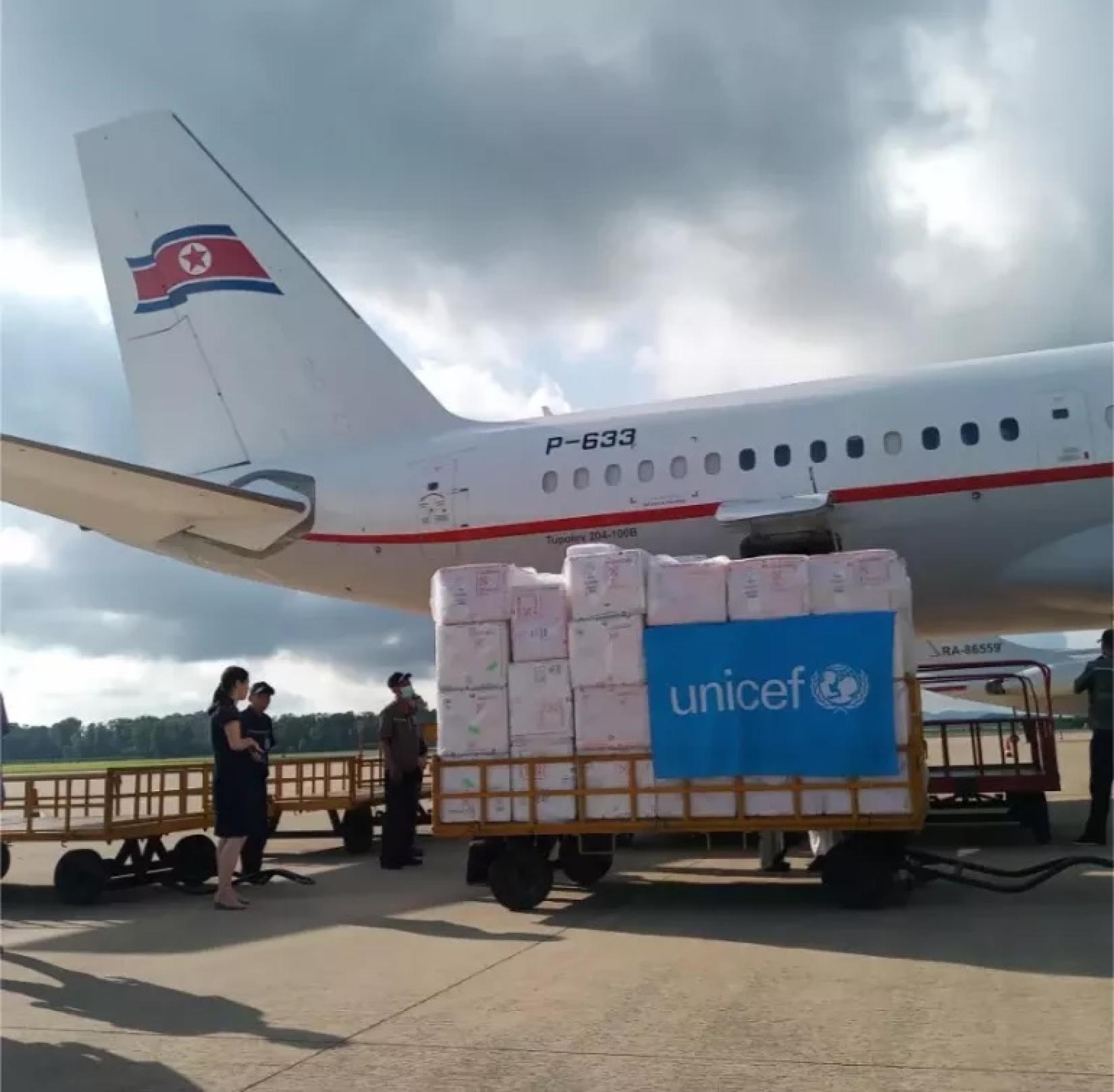Life-Saving Vaccines for Children and Pregnant Women delivered to Democratic People’s Republic of Korea
18 July 2024
New supplies provided by Gavi, the Vaccine Alliance, and UNICEF to be used during nationwide catch-up immunization campaign.

Bangkok, Thailand, July 18, 2024 – UNICEF, in partnership with Gavi, the Vaccine Alliance (Gavi) and the World Health Organization (WHO) has delivered three vital consignments of vaccines to the Democratic People's Republic of Korea (DPRK) intended for more than 600,000 children and pregnant women who have missed out on life-saving vaccinations since the COVID-19 pandemic.
More than four million doses of Measles-Rubella (MR), Tetanus-Diphtheria, Bacille Calmette-Guérin (BCG), Hepatitis B, Inactivated Poliovirus Vaccine (IPV) and other antigens were flown to Pyongyang on chartered flights over recent days.
The Ministry of Public Health (MoPH) is expected to use most of the vaccines in September for a nation-wide catch-up campaign targeting children and pregnant women who have been unable to receive one or more vaccinations since 2021.
The targeted population includes babies born this year who have not received a single vaccine dose, leaving them unprotected from potentially serious infectious diseases. The remaining vaccines will be used to restore the regular immunization programme.
“The return of essential vaccines marks a significant milestone towards safeguarding children's health and survival in this country,” said UNICEF DPRK Acting Representative Roland Kupka. “UNICEF is proud to continue its longstanding support to the DPRK immunization programme.”
Before the COVID-19 pandemic, national immunization coverage in DPRK reportedly exceeded 96 per cent for most routine vaccines. But the coverage rate dropped sharply with the onset of COVID-19, when the closure of DPRK borders and the imposition of import restrictions led to the exhaustion of vaccine stocks.
The vaccination drive is the outcome of extensive collaboration between UNICEF, Gavi, and WHO. Among the newly-arrived vaccines, Gavi, has supported the procurement of 1,339,000 doses of MR, 495,600 doses of IPV, and 190,200 doses of Pentavalent vaccines.
“The resumption of vaccine supplies is a critical step towards reestablishing the national immunization program, protecting achievements such as polio eradication and measles elimination and restoring immunization coverage to pre-pandemic levels,” said Sam Muller, Head of Euro Asia-Pacific at Gavi. “We very much look forward to intensifying our dialogue with the government to fully scale-up our support.”
Besides the procurement of supplies, UNICEF is supporting the MoPH with the transportation of vaccines to provincial and county warehouses, as well as field monitoring and assistance to 7,200 immunization doctors to ensure that vaccines reach all children and pregnant women needing them.
“While we welcome the arrival of these vaccines, we continue to urge our government partners in DPR Korea to facilitate the earliest possible return of UNICEF and all UN international staff,” said Kupka.
“The reopening of the border and the return of UNICEF’s full team to DPR Korea will be critical to ensuring more essential support can be provided in 2024 and programmes can be scaled up as necessary to meet the needs of children and women.”
Vaccine Shipment Details
On July 15, 16 and 18, 2024, three vaccine shipments arrived in DPRK, including:
- 680,000 doses of Bacille Calmette-Guérin (BCG) vaccine
- 309,500 doses of Hepatitis B vaccine
- 1,339,000 doses of Measles-Rubella (MR) vaccine
- 291,400 doses of Pentavalent vaccine
- 1,092,000 doses of Tetanus-diphtheria (Td) vaccine
- 495,600 doses of Inactivated Polio Vaccine (IPV)
###
Download multimedia content here: LINK
For more information, please contact:
- Simon Ingram, Regional Chief of Communication and Advocacy, UNICEF East Asia & Pacific Tel: +66610283755, Email: singram@unicef.org
- Chiara Frisone, Communication Specialist, UNICEF East Asia & Pacific, Tel: +66 6269 25897, Email: cfrisone@unicef.org
- Eunice Kilonzo-Muraya +41 76 424 85 03 ekilonzo@gavi.org
About UNICEF
UNICEF promotes the rights and wellbeing of every child, in everything we do. Together with our partners, we work in 190 countries and territories to translate that commitment into practical action, focusing special effort on reaching the most vulnerable and excluded children, to the benefit of all children, everywhere.
For more information about UNICEF East Asia & Pacific and its work for children, visit www.unicef.org/eap
Follow UNICEF East Asia & Pacific on Twitter , Facebook, Instagram, and LinkedIn
About Gavi, the Vaccine Alliance
Gavi, the Vaccine Alliance is a public-private partnership that helps vaccinate more than half the world’s children against some of the world’s deadliest diseases. The Vaccine Alliance brings together developing country and donor governments, the World Health Organization, UNICEF, the World Bank, the vaccine industry, technical agencies, civil society, the Bill & Melinda Gates Foundation and other private sector partners. View the full list of donor governments and other leading organisations that fund Gavi’s work here.
Since its inception in 2000, Gavi has helped to immunise a whole generation – over 1 billion children – and prevented more than 17.3 million future deaths, helping to halve child mortality in 78 lower-income countries. Gavi also plays a key role in improving global health security by supporting health systems as well as funding global stockpiles for Ebola, cholera, meningococcal and yellow fever vaccines. After two decades of progress, Gavi is now focused on protecting the next generation, above all the zero-dose children who have not received even a single vaccine shot. The Vaccine Alliance employs innovative finance and the latest technology – from drones to biometrics – to save lives, prevent outbreaks before they can spread and help countries on the road to self-sufficiency. Learn more at www.gavi.org and connect with us on Facebook and X (Twitter)


